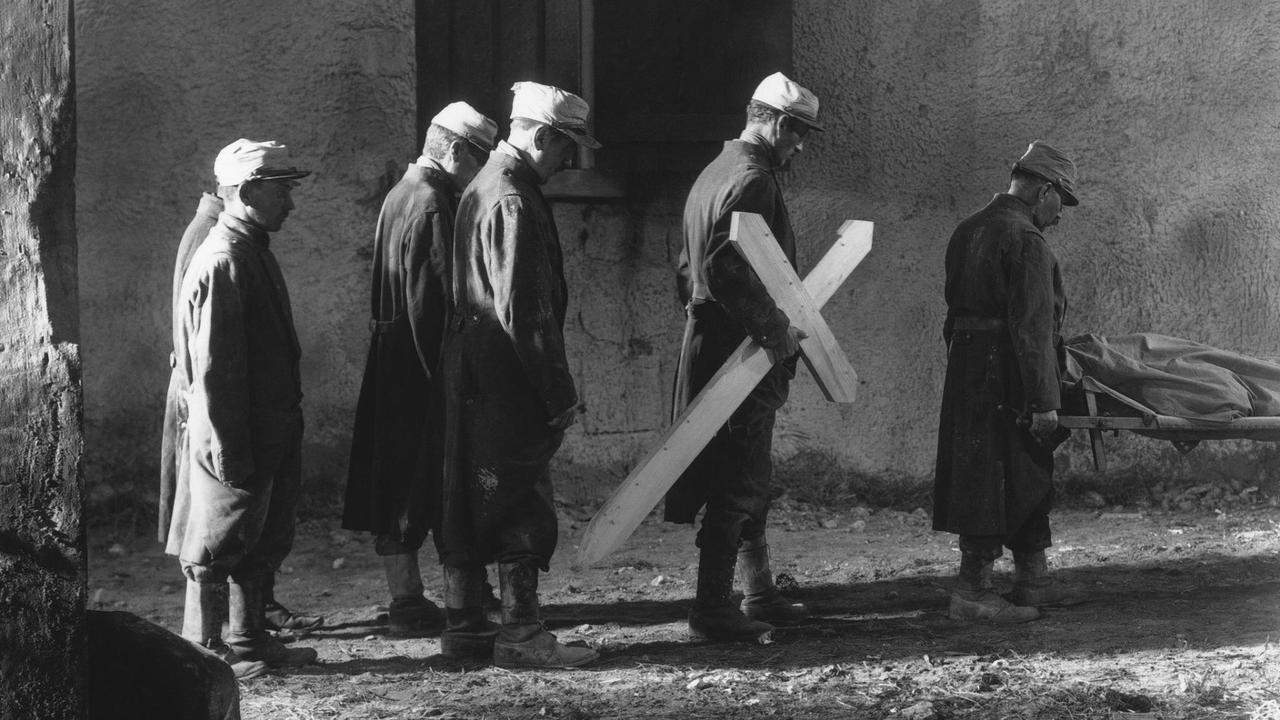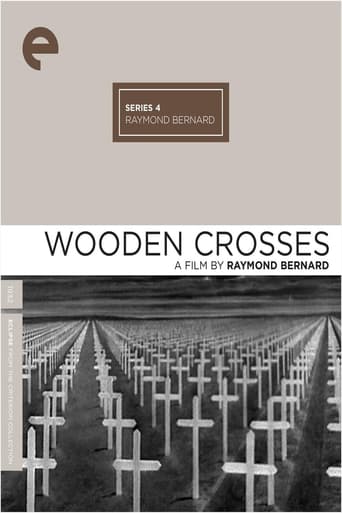Brightlyme
i know i wasted 90 mins of my life.
Stoutor
It's not great by any means, but it's a pretty good movie that didn't leave me filled with regret for investing time in it.
Ketrivie
It isn't all that great, actually. Really cheesy and very predicable of how certain scenes are gonna turn play out. However, I guess that's the charm of it all, because I would consider this one of my guilty pleasures.
Guillelmina
The film's masterful storytelling did its job. The message was clear. No need to overdo.
clanciai
What makes this film so impressive is its sinister direction, always kept at a calm distance but firm control by Raymond Bernard in visualizing a hell on earth worse than any hell imaginable, as it gives an all too convincing impression of never ending. The central battle scene in the middle of the film gives its definite stamp of a relentlessly realistic documentary in which category it outshines almost all the other first world war films including "All Quiet on the Western Front" (more personal), Rex Ingram's "The Four Horsemen of the Apocalypse" (more sentimental), Stanley Kubrick's "Paths of Glory" (more theatrical) Renoir's "The Grand Illusion" (more romantic) and "Oh What a Lovely War!" (musical). Not just the long great battle scene, but many scenes give the impression of going on forever, as they are so implacably sustained resulting in an overwhelming impact, like the dying corporal scene with Charles Vanel, who continued a long distinguished career in films with above Henri-Georges Clouzot in the 50s, and his death scene here is only a prelude to what follows - one can understand the veteran from that war who in 1962. when seeing the film on TV, committed suicide afterwards. It's all about ordinary men, good faithful soldiers, who keep on cheering and making the best of it as if the reality of the timeless horror was just something to accept as the ordinary, their natural cheerful moods and the irony of the absurd military self-deceit accentuating the superior quality of this film as the most realistic of first world war films.
fbarthet
One reviewer accuses "Les Croix de Bois" of not giving any reason/explanation/philosophical whatever for the Great War.He terribly missed the point."Les Croix de Bois" is adapted from one of the most famous French novel written about WWI. Roland Dorgeles was a veteran and his main purpose was to talk about his own experience and not "to make a point" against war. The movie is just about that. Recrating an experience. A terrible one.Raymond Bernard was himself a veteran and it shows. The depiction of the life in the trenches is vivid. We feel under our skin the misery of the soldiers, their small moment of joy and their fear in front of something to big to be comprehended. You do not think of philosophy when machine guns are screaming at you.Raymond Bernard employed a lot of actors and crew members who actually were in the trenches and he managed to show war on a daily basis from the smallest event to the major assaults. The 10 minutes battle in the middle of the film is so realistic that it looks like a war documentary. In the early thirties the former battle sites were not just memories. The scars were still there. Waiting for the next ones.The acting is a bit dated, particularly Pierre Blanchar who has a tendency to overplay and is far too old for the role. But he fought too during the war and his fixed eyes are the result of a gas attack.This movie is to be put alongside "Battleground" or "A Walk in the Sun". The Zero Level of War. Just Men alone and scarred. No reasons, no explanations, and certainly no Philisophy.
samhill5215
My summary seems to imply I found this film tedious. No, that's not the case. If anything it's very close to a masterpiece. There's not enough space to recount its memorable sequences. In fact everything about it is memorable. What stands out is the way war reduces individuals to cogs in a machine of death and destruction. A person's background, education, social standing, his worth as a person, counts for nothing. All that matters is his ability to run headlong into a volley of bullets in what is surely diametrically opposed to his instinct for survival. The politics of war are useless, nobody really cares why they're fighting. They only want to stay alive. This is best portrayed in the scenes of the tunnel dug by the Germans to place explosives under the French positions. The French soldiers know full well what is about to happen but their superiors do nothing to protect them and in scene after scene they wait for the sound of the digging to stop. When they're relieved they rush to shoulder their packs and hurry out of their now compromised safe-place seemingly unconcerned for their replacements. They're safely away when the explosion takes place. All we see is the plume of smoke and are left to imagine the horror above, like the soldiers, who continue on their way, only too glad to be alive. And this is only one vignette of the many that make up this film. But if there's one thing it brings out most vividly is how tedious war is. As a civilian I have a distorted view of war as ceaseless combat. Intellectually I know this to be false but our arts concentrate on the action in war and ignore the endless hours in-between, when nothing happens and soldiers just wait and wait and wait. "Wooden Crosses" portrays this tedium better than any other I know of. We, the viewers, get caught up in it, are oppressed by it and want to turn away but can't because we have become involved in the nearly anonymous soldiers and want to see them come out alive even though we have come to expect the worst. This is not an easy film to watch. But it should be required viewing.
lewisbeer
Comments on this film are bound to centre around comparisons to All Quiet On the Western Front - reasonably enough, since Wooden Crosses was specifically made as a rival to that film. It isn't as engrossing as Milestone's classic, perhaps because it never really characterises the soldiers strongly enough, and also because it lacks the variety of incident which makes All Quiet so entertaining despite its grim subject matter and episodic structure.But both these flaws are also strengths: Bernard's skill in conveying the de-humanising effects of war, as well as the sheer repetitious tedium of the ordinary soldier's experience, lend to his film a bitterness and realism which its - occasionally naive - American predecessor lacked. There are one or two scenes in this film so bitter and horrifying that no war film matched them until at least the 1950s.For this reason, the film may find more sympathy with today's audiences, who - after Apocalypse Now, Full Metal Jacket, The Thin Red Line, Jarhead etc - expect a war film to immerse them in sheer violent futility for two hours, and are likely to regard lack of incident as a mark of authenticity.This film is nothing if not authentic (the cast was made up entirely of war veterans), and the documentary realism of the battle scenes was a real shock to me. Complaints that, unlike most war films, it makes no reference to the wider context of the war, are understandable...but I think they miss the point. The film is indeed a violent mess: what else must it have felt like for the men in the trenches? Wooden Crosses faithfully plays out Lew Ayres' famous speech from All Quiet (maybe paraphrasing here): 'We live in the trenches and we fight. We try not to get killed. That's all.' I thought I already knew how inventive and daring early '30s film-makers were, but just on the strength of this film (haven't watched Les Miserables yet...) Bernard deserves to stand with the best of them - Lang, Milestone, Vidor, Eisenstein. The lyrical beauty of so many of the images in Wooden Crosses, and the intense horror of some others, left me gaping in disbelief at the screen, and will always stay with me. Perhaps because it's 76 years old, and because it's such an unsung pioneer, this film makes me revert to clichés and superlatives. But it really is one of the very best war films ever made.

